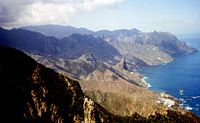You can help expand this article with text translated from the corresponding article in Spanish. (April 2013) Click [show] for important translation instructions.
|
Anaga massif (Spanish: Macizo de Anaga) is a mountain range in the northeastern part of the island of Tenerife in the Canary Islands. The highest point is 1,024 m (Cruz de Taborno). It stretches from the Punta de Anaga in the northeast to Cruz del Carmen in the southwest. Anaga features the mountain peaks of Bichuelo, Anambro, Chinobre, Pico Limante, Cruz de Taborno and Cruz del Carmen. The mountains were formed by a volcanic eruption about 7 to 9 million years ago making it the oldest part of the island.[1] Since 1987 it has been protected as a "natural park", reclassified as "rural park" in 1994.[2] Since 2015 it is also an UNESCO Biosphere Reserve and is the place that has the largest number of endemic species in Europe.[3]




It is a remote and wild area characterized by humid forests, such as laurisilva. Native plant species include Ceropegia dichotoma, Ceropegia fusca and Echium virescens. The Macizo de Anaga is also rich in archaeological finds, among which is the Mummy of San Andrés belonging to the ancient Guanche. The main villages in the Macizo de Anaga are San Andrés, Taganana and Igueste de San Andrés. A place in the mountains known as El Bailadero is believed to have been a place where witches were practicing witchcraft and dancing around a bonfire.[4] Anaga also has a cryptozoological legend. It is about the so-called Anguila peluda, which was a monstrous eel of great size that inhabited a puddle at Punta de Anaga and that terrified the local people.[5]
Gallery
edit- The Anaga Mountains
See also
editReferences
edit- ^ Carracedo, Juan Carlos; Troll, Valentin R. (2021-01-01). "North-East Atlantic Islands: The Macaronesian Archipelagos". Encyclopedia of Geology. pp. 674–699. doi:10.1016/B978-0-08-102908-4.00027-8. ISBN 9780081029091. S2CID 226588940.
- ^ Protected natural areas Archived 2013-11-09 at the Wayback Machine
- ^ El macizo de Anaga alberga mayor concentración de endemismos de toda Europa
- ^ "Los bailaderos". Bienmesabe.org. 2012-10-22. Retrieved 2015-07-25.
- ^ "El misterioso viaje de las anguilas desde el Triángulo de las Bermudas a los barrancos canarios". ABC. Archived from the original on 7 October 2016. Retrieved 12 December 2024.